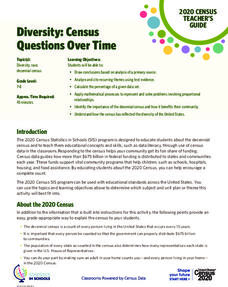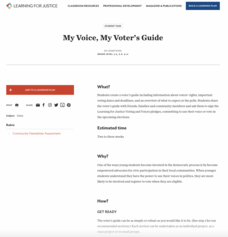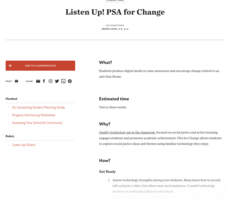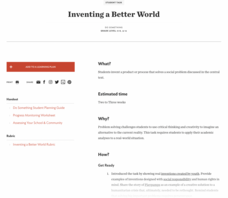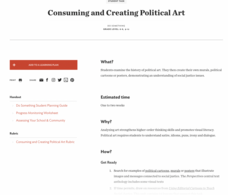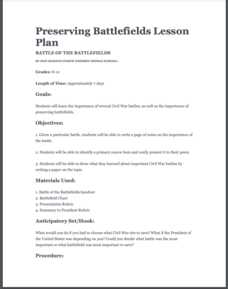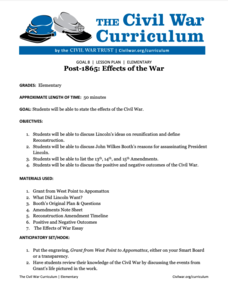Constitutional Rights Foundation
The Troubled Elections of 1796 and 1800
Congress does more than create new laws. Political scientists delve into the elections of 1796 and 1800 to understand how political parties, the Electoral College, and personal agendas affected the election process. The resource also...
Constitutional Rights Foundation
Global Warming and the Paris Agreement
Global warming: a political debate or a scientific fact? Young historians read text, complete activities, and participate in group discussion to understand the political debate surrounding global warming and the US decision to withdraw...
Constitutional Rights Foundation
Automation and the American Worker
A thought-provoking resource examines the future of automation and the effects on employment. Academics read informational text, complete written prompts, and participate in activities to understand automation and the possibilities for...
Arcademics
Country Toad
Hop from country to country to practice knowledge of international capitals using an interactive video game. Pupils take control of frog avatars and direct them to leap from the name of a capital to its home country. The video game...
Arcademics
Toad Hop
Hop-scotch your way across the world to help improve class members' skill and accuracy in identifying capital cities. By using a frog avatar, learners leap to the correct country for each capital city as it flashes up on the screen....
US Department of Commerce
Featured Activity: City Planning With Census Data
What's more important ... an ice cream store or a police station? How about a school or a hospital? Using a simulation game, pupils allot resources as the federal government would based on the census. Discussion questions round out the...
US Department of Commerce
Featured Activity: Exploring Questions for the 2020 Census
Just what is the census for? Using data and census questions, class members explore how officials gather information. Then, they consider how the government uses the answers to determine how it spends its money with a collaborative...
US Department of Commerce
Apportionment: Grades 7-8
One person, one voice ... right? Using a simulation where uneven groups are given the same voice, scholars discover why fair apportionment based on an accurate census is important. Once finished, they use actual data to consider what...
US Department of Commerce
Constitution Day
Give your Constitution Day celebration a timely slant by discussing the census! An activity that includes analysis of the Constitutional call for a census, along with scaffolded worksheets, help pupils understand the connection between...
US Department of Commerce
Diversity: Census Questions Over Time
The story of race in the United States continues to evolve, and the numbers show it. Using data from the last two census counts, learners consider recent demographic shifts. They then analyze the information to hypothesize: What could...
Teaching Tolerance
Journalism for Justice
Roll the presses! Or at least have your class members participate in the time-honored tradition of the student press by creating their own newspapers or journalist pieces on a social problem. After conducting research and collaborating...
Teaching Tolerance
Film Festival
Everybody's a critic—even your pupils! Using the included resources as a guide, screen films related to social justice and ask film enthusiasts to critique them. Publish the reviews for your school community or develop a film festival...
Teaching Tolerance
My Voice, My Voter's Guide
Class members may be too young to vote, but that doesn't mean their voices are silent! After researching key information, such as policies for registering to what to expect at the polls, young scholars create and present election guides...
Teaching Tolerance
Listen Up! PSA for Change
Challenge scholars to speak up about a topic by creating a public service announcement or social media blitz about an issue they feel passionate about. Have them research their issues, then decide the best way to take their messages to...
Teaching Tolerance
Inventing a Better World
From play pumps that provide clean water to shoes made from trash, innovators change the world one invention at a time. After researching various inventions, young entrepreneurs develop their own. Extension opportunities include prompts...
Teaching Tolerance
Consuming and Creating Political Art
A picture is worth a thousand words, but political art may be worth even more! After examining examples of political cartoons, murals, and other forms of public art, class members create their own pieces to reflect their ideals and...
American Battlefield Trust
Civil War Battle Strategy
But for a fluke, 1862 could have gone differently during the Civil War. When Union troops found Robert E. Lee's battle plans for critical engagements in Maryland wrapped around cigars and tossed aside, history changed forever. Class...
American Battlefield Trust
Middle School Assessment for the Civil War Curriculum
The bravery of African American troops on the frontlines directly impacted the lives of the newly freed enslaved people. Using documents, including letters from African American troops and an excerpt of the Emancipation Proclamation,...
American Battlefield Trust
Creating Civil War Multimedia
What was it like to live through the Civil War? Learners investigate the question by creating multimedia presentations. With a scaffolded approach that includes research, creating a biopic poem, storyboard, and then polished multimedia...
American Battlefield Trust
Preserving Battlefields
Save that site! Budding historians go on a rescue mission to save important Civil War battle sites using a project-based lesson. After carefully researching the importance of critical engagements and evaluating current threats, learners...
American Battlefield Trust
Contrasting the North and South Before the War
Fundamental differences between the North and South led to the South adopting a system of enslaved labor. These abstract ideas become concrete when class members create a standing cube using information provided in the resource. Young...
American Battlefield Trust
Civil War Civilian Experience
Imagine what would it have been like to watch a dramatic battle of the Civil War in your own backyard. Young scholars ponder this scenario while looking at firsthand accounts from the Battle of Franklin, along with modern photos of the...
American Battlefield Trust
Post-1865: Effects of the War
What did Lincoln want? Historians still debate this question, and perhaps people will never fully know. Class members examine the legacies of the war, including the Thirteenth, Fourteenth, and Fifteenth Amendments. The lesson plan also...
American Battlefield Trust
Civil War Overview: Elementary Lesson Plan
How do you teach the Civil War and all its intricacies within the time limits of an average school day? Using a three-part plan, teachers easily integrate coverage of key Civil War battles into the unit. The lesson includes activities to...











